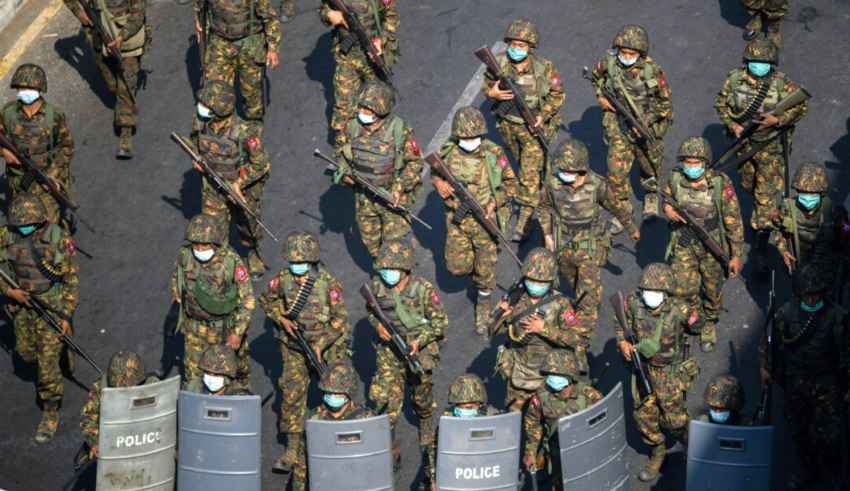
Ignoring calls for clemency from families and the international community, the Burmese junta executed four men for the first time in more than three decades.
This marks a new threshold in the repression carried out by the Burmese army since the coup of February 1st, 2021, led by General Min Aung Hlaing, which threw the Southeast Asian country into a merciless civil war that has already left several thousand dead. Faced with fiercer than expected armed resistance, passive resistance from the masses and deep economic difficulties, against a backdrop of international sanctions, Tatmadaw (the name of the Burmese army) is stiffening again. The junta is in trouble, so it seems it is trying to terrorize.
More than a hundred people have been sentenced to death and 15 000 arrested under martial law since the military took power. But still, they are struggling to impose their control over the country. The international community should condemn the cruelty of the junta. In addition leaders the fragmented opposition should try to unite the opposition. Because it is made up of dozens of armed groups.
A brutal warning
The profiles of the four victims, two of whom are veteran figures in the struggle for democracy, sound like a brutal warning to the entire resistance. Kyaw Min Yu was a veteran of the 1988 student revolt (dawn of the Burmese Spring that put Aung San Suu Kyi on the map), Phyo Zeya Thaw, a former politician from Aung San Suu Kyi’s National League for Democracy (NLD). Hla Myo Aung and Aung Thura Zaw, who had killed a woman who was suspected of being an informant for the military according to the junta. On the other hand we have the AAPP (Assistance Association of Political Prisoners) who claim they simply involved in protests and resistance movements.
The fighting is raging in the mountainous regions where the army is deploying heavy weapons, but is also facing an increasingly hardened guerrilla group under the banner of the new People’s Defence Force (PDF). As in the Rakhine State, in the west, where the rebel group Arakan Army claims to have captured fourteen soldiers on July 19th. On these shifting front lines, it is difficult to assess the balance of power, as the country’s borders have been closed since the pandemic, and as both sides multiply triumphalist communiqués.
This situation further accentuates the international isolation of the regime. Burma is even ignoring the appeals for clemency from Cambodian Prime Minister Hun Sen, who is in charge of the rotating presidency of Asean and who was trying to work out a modest compromise of peace negotiations, despite Western criticism.
The executions are also an embarrassment to China, whose foreign minister, Wang Yi, made a rare visit to Burma earlier this month, appearing with the military while calling for dialogue with the opposition.
General Min Aung Hlaing, for his part, is turning to Russia, his main weapon supplier, where he recently went again in search of precious parts to continue his aerial bombardment operations against the insurgents, which augur a merciless war of attrition.
These news could serve as an electroshock to bring international attention back to the crisis, which has been relatively forgotten since the outbreak of war in Ukraine. “These perverse acts must mark a turning point for the international community” reacted Tom Andrews (UN special rapporteur on human rights in Burma) on Twitter, and rightfully so.
Glimpses of hope
The United Nations’ highest judicial body declared itself competent to judge a case against Burma, accused by Gambia of genocide against the Muslim minority of Rohingya. In a case filed in 2019, the West African country accuses the Burmese leadership of violations of the 1948 U.N. Genocide Convention. In 2017, hundreds of thousands of Rohingya Muslims fled a bloody crackdown by the military and Buddhist militias. There have been reports of killings, rapes and arson.
The ICJ (International Court of Justice) was issuing its decision Friday 22nd of July on arguments made in February by Burma’s ruling junta that the court should dismiss the case while it is still in its preliminary stages. The judges rejected one by one the four objections made by the Burmese delegation, which considered that the application is not admissible for several reasons.
Gambia not directly concerned ?
First, because it is brought by Gambia on behalf of the Organization of Islamic Cooperation (OIC). In fact, the ICJ was created in 1946 to settle disputes between individual states. Secondly, according to Burma, Gambia is not directly involved in the alleged genocide. Moreover, the Asian country had withdrawn itself from part of the international convention applicable in this case. Lastly, Burma argued that the application should be rejected because there was no explicit dispute between it and Gambia at the time the application was filed, which is one of the rules of the ICJ. All these arguments were rejected by the magistrates, according to whom there was indeed a dispute between the two countries as evidenced by statements made in 2018 and 2019 to the UN. Furthermore, “The Gambia has delivered the proceedings personally as a state party to the court and to the convention (…) this is very much a dispute between The Gambia and Myanmar. We seek to protect not only the rights of the Rohingya, but our own rights as a State party to the Genocide Convention by holding Myanmar to its erga omnes partes obligations not to commit genocide, not to incite genocide, and to prevent and punish genocide” is stating President of the Court Donoghue in the conclusions made by the ICJ on the case concerning the application of the Convention on the Prevention and Punishment of the Crime of Genocide.
Following this decision, the case can now proceed on the merits. It could take several years, however, before the court renders its verdict. The ICJ’s rulings are binding and cannot be appealed, but the court has no way of enforcing them.
Increasing evidence of crimes against humanity, according to the UN
There is growing evidence that crimes against humanity have been committed in Burma since last year’s coup, UN investigators said Tuesday 9th of August.
In its annual report, the U.N. Independent Investigation Mechanism for Myanmar (IIMM) points out that women and children are particularly targeted. It is stated in this years report that “there are ample indications that since the military takeover in February 2021, crimes have been committed in Myanmar on a scale and in a manner that constitutes a widespread and systematic attack against a civilian population”.
Murders, torture, deportations, rapes, persecutions… the report establishes a long list of crimes against humanity that have been committed. There are ever more regions that are affected by this plague of violence. Established by the UN Human Rights Council in September 2018, this investigative mechanism aims to collect evidence on the most serious crimes for possible criminal proceedings. “The Mechanism has also collected information indicating that children in Myanmar have been killed; tortured; seriously injured; arbitrarily detained, including as proxies for their parents; subjected to sexual and gender-based violence; and conscripted and trained by security forces and armed groups. Such crimes are among the gravest international crimes but are also historically underreported or underinvestigated”.
More executions could follow, after the events of July. Let’s not forget more than 100 death sentences have been counted since the coup. The U.N. fact-finding mechanism on Myanmar has not been authorized by the Burmese authorities to visit the country. But the experts have collected information from more than 200 sources since its creation. These include interviews, documents, videos, photographs and geospatial images. It seems that whether you are a famous or anonymous figure, nothing, not even the international community, will be able to protect you.
Comforting words by Nicholas Koumjian, head of the investigative mechanism, who said in a statement on February 1st : “Those who are considering committing crimes should be aware that serious international crimes have no statute of limitations. International justice has a very long memory and one day the perpetrators of the most serious international crimes in Myanmar will be held to account.” Giving hope for a positive outcome in the end.
https://www.theguardian.com/world/2022/jul/25/myanmar-junta-who-four-people-executed
https://www.aljazeera.com/news/2022/7/17/myanmar-leader-goes-shopping-for-support-weapons-in-moscow
https://www.icj-cij.org/public/files/case-related/178/178-20220223-ORA-01-00-BI.pdf
https://reliefweb.int/attachments/1a919ee0-5847-4fec-9735-52d444332219/A-HRC-51-4-E.pdf
By The European Institute for International Law and International Relations.














